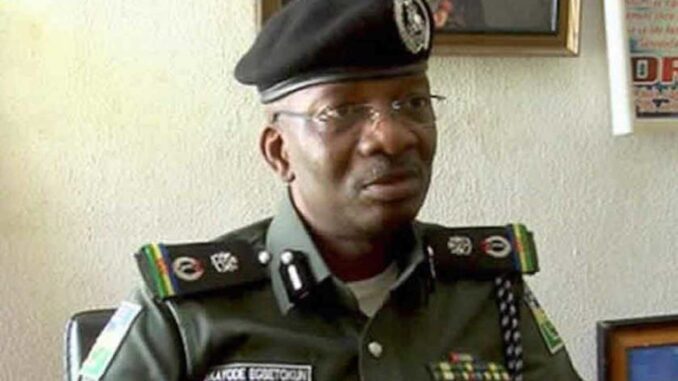
Responding to recent questions regarding the indiscriminate checkpoints across the country that disrupt the flow of traffic and encourage extortion and other inappropriate behaviours by police officers, the acting Inspector-General of Police, Olukayode Egbetokun, stated that the Nigeria Police Force cannot vacate the checkpoints.
He added that checkpoints are vibrant parts of visibility policing and are crucial to the effective policing of contemporary Nigerian society.
Consequently, Egbetokun has recently ordered the deployment of the Monitoring Unit and X-Squad operatives, in collaboration with supervisory senior officers, to conduct thorough assessments of key checkpoints along the nation’s highways.
Undoubtedly, the Nigeria Police are widely empowered under the Police Act to maintain public safety and public order as they may deem necessary. In fact, the Inspector-General of Police is also empowered under the Act to establish rules and regulations that facilitate the functions of the Police. Specifically, police checks serve a variety of purposes, one of which is to deter criminals from engaging in criminal activities. Give or take, the presence of the police at checkpoints somehow gives a psychological boost to motorists plying in dangerous and crime-prone areas. Police checkpoints help regulate traffic flow and ensure that drivers adhere to traffic laws. Strategically located at different parts of the country and close to Nigeria’s borders with neighbouring African countries, police checkpoints help monitor and regulate the movement of people and goods, ensuring compliance with immigration laws and preventing terrorists and bandits from illegally crossing the borders and entering Nigeria.
In certain health issues such as during the last COVID disease outbreak, health emergencies, or natural disasters, checkpoints can be used to control the movement of people, potentially limiting the spread of illnesses. In a crime-prone community or kidnapping-infested area, community policing checkpoints can facilitate interactions between law enforcement officers and the community, allowing for positive engagement and building trust between the police and citizens.
However, citizens of this country are daily assailed by various acts of abuse of their civil rights by the police in the exercise of their statutory duties. These acts range from unlawful arrests, harassment, extortion, intimidation, false imprisonment, torture, extrajudicial killings, solitary confinement, and all forms of inhuman and degrading treatment, which are expressly prohibited and outlawed by the constitution. This is a sad and regrettable reflection of the mindset of a police force that is yet to wean itself from its anachronistic colonial past, where it was set up as an instrument of repression, oppression, and victimisation of citizens perceived by the police as their enemies.
Instances of police officers at checkpoints abusing their power and extorting money from innocent motorists are commonplace across the country. In the course of extorting money from innocent motorists queuing up at the checkpoints, the police recklessly use wedges and broken woods to narrow down the width of the expressways, causing incredible vehicular jams along the expressways.
Not infrequently, the police use excessive force or violence without proper justification to compel motorists to accede to their bids. This results in serious harm or even death to motorists and individuals passing through the checkpoints. In some cases, police officers use checkpoints to harass or intimidate individuals, especially if they belong to certain groups perceived to be habitually bad; such as ‘yahoo boys.’
Therefore, it is crucial for the authorities to actively address and eliminate the extortion by the police at checkpoints across the country. Every day, motorists recount horror stories of their encounters with police or security personnel at the various checkpoints on the road. Thus, the authorities should put an end to this crime along the expressways.
To start with, the number of checkpoints littering our country’s expressways is excessive and must be reduced. For instance, the Lagos-Onitsha Expressway is encumbered with about 60 checkpoints, such that every three to five minutes of driving, approximately 200 meters, the vehicle slows down due to traffic logjams caused by police, military, or customs checkpoints. With this ugly situation, travelling to and fro the Eastern part of Nigeria has become a traumatic experience because travellers can hardly predict when they will finally reach their destinations.
There seems to be an overkill of security beef-ups in some parts of the country, which has sadly created a fresh hurdle for travellers to those parts of Nigeria. For example, connecting the Onitsha Bridge Head to Onitsha-Aba-Owerri or Umuahia or Port-Harcourt by road is now a daunting task due to the heavy traffic gridlock caused by indiscriminate police or military checkpoints along the expressways.
Consequently, the Federal Government should abate the nuisance at the country’s checkpoints. The excessive number of checkpoints burdening the country’s highways needs to be reduced. Motorists, like all individuals, deserve to be treated with dignity and respect. It is essential for police and law enforcement agencies to exhibit transparency, accountability, and reasonableness at checkpoints. Extorting money from motorists not only betrays this trust but also undermines the fundamental principles of justice, fairness, and respect for citizens’ rights.
Police checkpoints should be conducted within the bounds of the law, and police officers, soldiers, customs officers, or other law enforcement personnel should always act by the rule of law.
Instead of resorting to violence, open dialogue, effective oversight, and adherence to the rule of law are crucial for maintaining the balance between public safety and individual rights. Every motorist is presumed innocent until proven guilty by a court of law of competent jurisdiction. Therefore, the rule of law ought to reign supreme over the arbitrary and capricious exercise of police power. Above all, the police should embrace modern technology to help in discharging its security work efficiently and without the need for physical presence at all times.
END

Be the first to comment